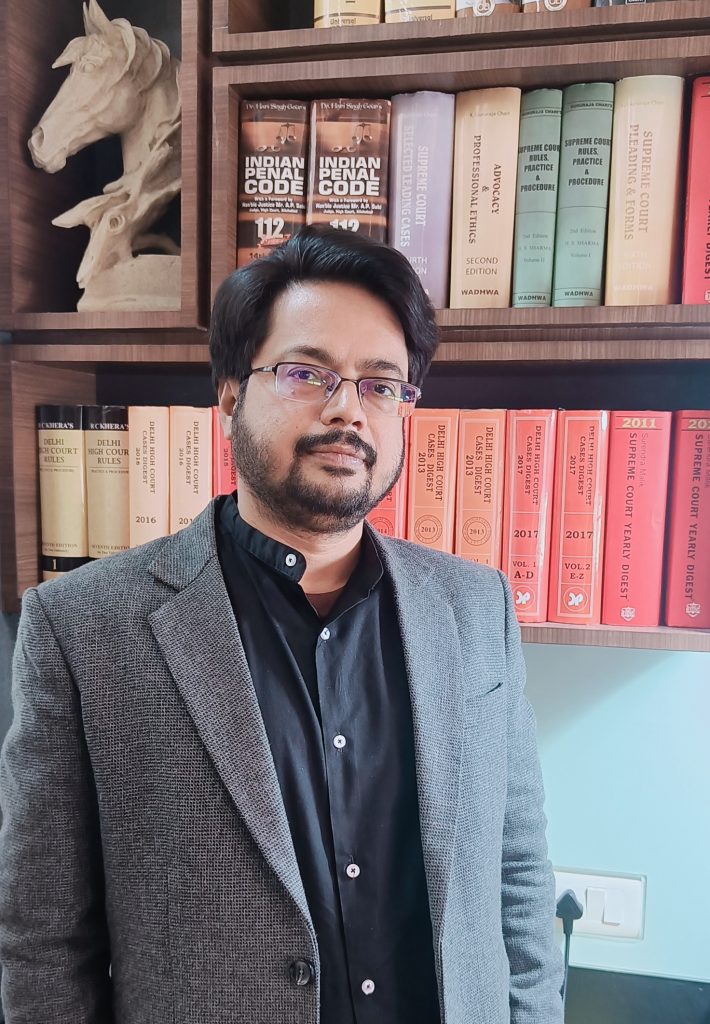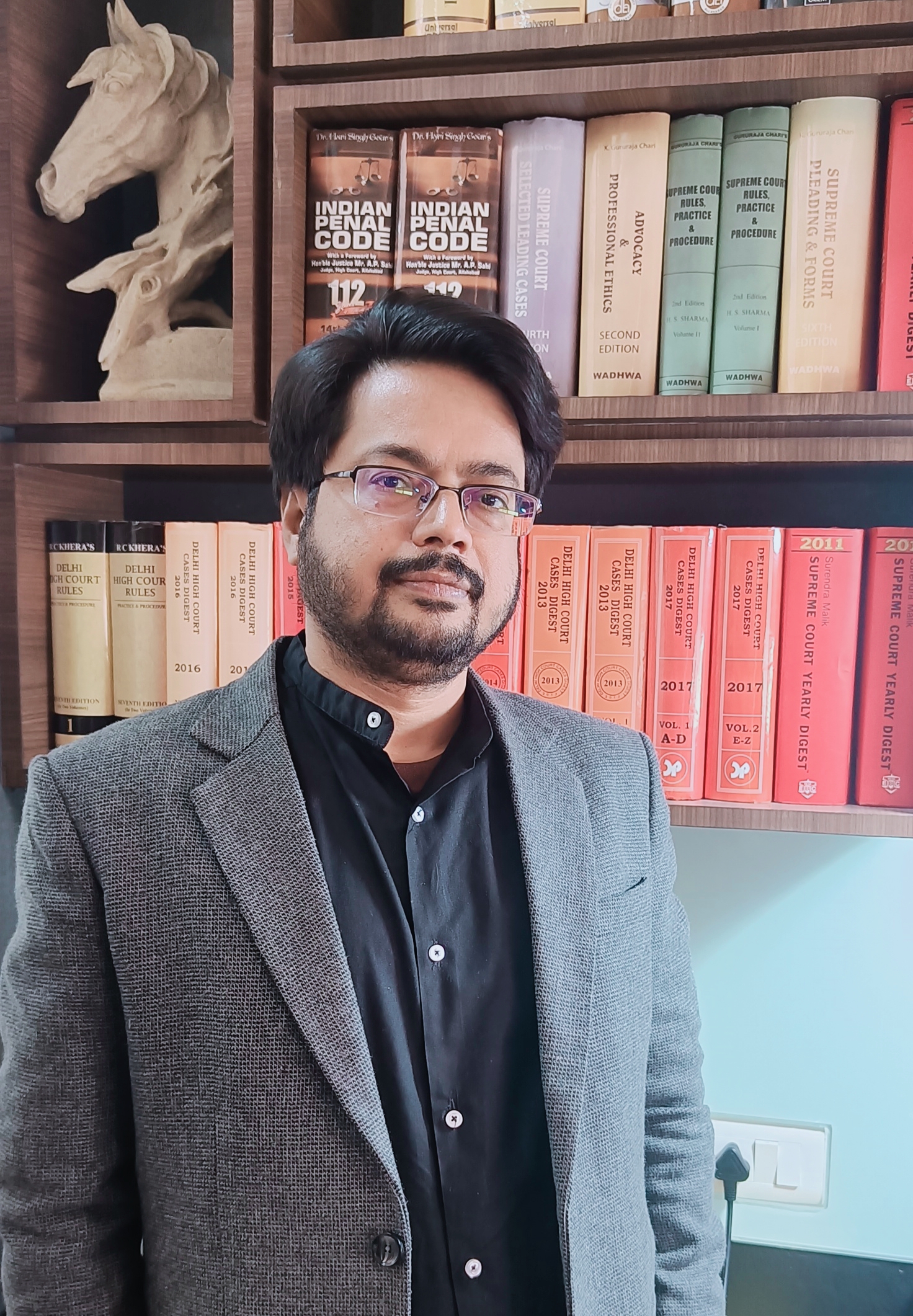This Interview has been published by Pragya Chandni and and The SuperLawyer Team

Sir, could you share with our listeners how you embarked on your journey in law? What motivated you to pursue a career in the legal field?
Infact, my current profession of being a litigation lawyer is my second avatar as a professional as I started my career as a Scientist/Assistant Professor of Physics at Delhi University and I still consider myself to be a scientist by training and education but a Lawyer by profession. I am a first generation lawyer with no direct or indirect background in Law till I completed my LL.B. My real-life experiences rather confrontation with Law and Law enforcement agencies and my quest for the justice to the common masses motivated me to make my career in Law. During my stint as Professor of Physics, I was quite captivated by the working of certain law enforcement agencies and other government Institutions under the aegis of Constitution of India and the interplay of the Legislature, the Executive and the Judiciary. Post my LL.B. from University of Delhi, I got shortly associated with the office of ASG, Government of India and AAG for the state of Rajasthan at Hon’ble Supreme Court, and thereafter, I started my own independent practice in the year 2012.
My cordial associations and relationships with my seniors at Supreme Court and other Courts helped me a lot in learning and developing the idea of litigation in a short span of time.
From your early career as a Jr. Associate at the office of the Additional Solicitor to become an Advocate-on-Record of the Supreme Court and to your current role as Senior Central Govt. Counsel, Counsel for DDA, Counsel For state of U.P. and several other PSUs including PNB & RFC and being lead and arguing Counsel for few big Corporate Houses like HAL Offshore, McDonald’s, Ultratech Cement, Binani Cement etc, you’ve navigated through different roles. How did these transitions shape your legal perspective, and what key responsibilities have defined your journey?
Though, I had very short stint as Junior Associate in the office of ASG, Union of India and AAG, State of Rajasthan but I had a lot of learning in those offices and that helped me develop basic idea of litigation in a short span of time and with almighty’s grace, I was also able to strike very cordial associations and relationships with my seniors colleagues as also officers of registry at Supreme Court and other Courts. After only 15-18 months of my Jr. Associateship, I got onto my own independent practice because I started getting a few independent assignments based on my basic understanding of Court Ecosystem. However, my relations with my seniors at Supreme Court, High Courts and District Courts/Tribunals helped me in perfect execution of those assignments, thereby getting the intended reliefs. This is how the journey began and since then I have never looked back.
I am practicing as an independent Litigation and Arbitration Lawyer since Aug’2012 at Supreme Court of India, Delhi High Court, Mumbai High Court & Other High Courts across India, DRTs, DRAT, NCLT, NCLAT CCI, CAT ( erstwhile BIFR & COMPAT) at New Delhi.
The key responsibilities include:
- Drafting & Vetting of Pleading of SLPs, Writs, PILs, Suits, Original Applications, Securitization Application, Misc. Applications, Service Matter Petitions, Claim Petition, Counter Claims, Evidence Affidavits, Legal Notice, Reply/rejoinders and conducting Civil Trials and Appeals as also Arbitration matters.
- Appearing in all Court proceedings before the Hon’ble Justices & Registrars of Supreme Court of India, Delhi High Court, Bombay High Court, CAT, DRT, DRAT, NCLT, CCI, COMPAT & SAT at New Delhi, Kolkata and Mumbai.
- Well versed with SARFAESI Act’ 2002, Recovery of Debts due to Banks & Financial Institutions Act’1993, DRT Rules, DRAT Rules, Banking Regulation Act’1949, Banking Companies Act’1970, Companies Act’2013, Insolvency & Bankruptcy Code’2016, SEBI Act’1992, PMLA Act’2002, Information & Technology Act’2000, Arbitration & Concilliation Act’1996, Specific Relief Act, Registration Act, Contract Act, Specific relief Act, Civil Procedure Code.
- Vetting of Contracts, Agreements, Licenses, Hypothecation, Mortgage & Conveyance Deeds.
I am regularly appearing and conducting Litigations before Supreme Court of India, High Court of Delhi & Mumbai, DRT- Mumbai, DRT Kochi, NCLT & NCLAT Delhi, NCLT Mumbai, High Court of Calcutta, High Court of Kerala at Ernakulum, High Court of Orissa at Cuttak for my clients. Apart from my appearances before the Courts, I am also representing many of clients in their Arbitration cases at Mumbai and Delhi. I am also a qualified Mediator and am empanelled as Mediator- at Supreme Court of India.
Your profile showcases extensive experience in Civil-Corporate Litigation, Arbitration, and White-Collar Crimes. How did you develop an interest in these specialized areas, and what challenges and rewards have you encountered along the way?
To be honest with you, as a first generation lawyer, you cannot be choosy as you have to run your show and household also. Therefore, during my initial years, I took variety of cases, which ranged from appearing before a Revenue Officer to going to Police Station or Human Right Commission. From drafting of criminal Complaint to drafting of Consumer Complaint. From drafting a Claim Petition for MACT to drafting a Claim Petition for Arbitral Tribunal. Doing almost all the work at Supreme Court/High Court registry myself. Took every assignment irrespective of its pecuniary rewards or forum or rigours with only one thing in mind that each case was learning experience and success at these cases boosted confidence and fostered new relations at different levels of hierarchy. Success in these small assignment perhaps got me noticed by my senior colleagues and few Corporate Heads and the insight, which I gained during these exposures lead me to convince my initial Clients with confidence. I started getting cases related to Banking and Recovery before DRT Delhi & DRT Mumbai and also erstwhile BIFR. After implementation of IBC regime, these cases took me to NCLT & NCLAT. These financial/ banking cases with big exposure values invariably involve criminal aspects of wilful default, siphoning off and diversion the funds, fraud or money laundering. Similarly Property disputes these days have intrinsically some criminal colour in form of forgery, cheating and Service matters may also have flavour of corruption involving PC Act. Thus, despite not exactly planning for venturing into a specific area of expertise, I gradually got specialised into these areas. The best reward and motivation to keep on moving in these areas of expertise was the pecuniary benefits and broad and global exposure to working of various Industries such as Cement Industry, Shipping Industry, Oil & Gas Industry, Minning Industry, FMCG Companies, Banking and Non-Banking Institutions, Event Management Companies, Hospitality Companies etc. However, the challenge is obvious, one needs to extensively study and understand working of each Industry so that one have an insight of practical execution of business in such Industry or Sector, secondly since stakes are high in these commercial matters, therefore there is constant pressure to outperform the routine practitioners and one has to keep toiling, traversing and translating the strategies into court room success.
You’ve represented significant industrial houses and corporations in high-stake litigation and arbitration cases. Could you share a specific case or accomplishment that you consider particularly impactful or challenging in your career?
There is not one or two but rather 4-5 cases, each in different domain of law, wherein my legal mettle along with personal traits of being lawyer was put to test. Out of 5, I succeed in three but lost in two but all 5 cases, I consider as most challenging and which left long lasting affect in my career journey. These cases gave me learning for lifetime and helped me to meta morph into a seasoned lawyer. It is difficult to describe the entire experience in this short interview but in hint, I can say that one matter was an arbitration matter against a big Corporate giant of this Country being represented through battery of senior designated lawyers. But as luck could have it, my grit and determination finally prevailed and the Tribunal went by merit and not by the stature of either the Corporate House or the Sr. Counsel. Another matter was a matter against a Head of top Government Institution, who had entangled a female employee in her service matters ostensibly, whereas in reality it was a criminal matter having contour of POSH and other criminal element. This Officer was being defended by a Sr. Counsel, who was from a family of Judiciary and exuded aura and confidence. Though, we had initial success, however his aura prevailed in later part. Finally our persistence paid and fortunately after 4.5 years this person was booked by CBI and taken into custody but not before we had filed several cases before several forums in 3-4 years unshakingly, unperturbed and undeterred by initial setbacks. The third one relates to a case before CCI & COMPAT, which gave me my entry into corporate litigation and again this was example of purely Out of Box thinking, wherein, we took advantage of legal technical loopholes to save 18.5 crores of rupees and to buy time to properly strategise our bankruptcy filling before NCLT, Kolkata. These instances lead me to believe in the famous saying- ‘ A lawyer never looses- either He Wins or He Learns ! ‘
How do you approach the unique challenges presented by different clients and Industries?
The first and foremost thing, which I do, is to understand and identify the core issue/dispute involved in the given case and the mindset of client and his desired goal. Thereafter, I make a fresh & unorthodox approach towards finding all the possible legal remedies available for the client and devise strategies with precision taking holistic view of the matter to suit specific requirement of the client but at the same time ensuring that each step involving the dispute resolution is in sync with the legal requirements. Most of the time it requires – ‘Out of Box thinking’ and Risk taking. At times, it involves working beyond clock hours and travelling to different cities and interacting with people from different walk of life. To have a clear and succinct understanding of an event or case, I meticulously study each transactions or step involved till arising of the dispute and thereafter take a practical overview of working of that Industry or Office to get nuances and peep into intention of the person or parties behind such transaction or dispute. Once I am clear on this, I devise a multi- pronged strategy to tackle the issue effectively and efficiently. In accordance to the strategy, the steps are legally executed to get the intended result. So far it has given me success@85-90%. I do not believe in misleading a client or over stating before a client and therefore adopt a pragmatic approach towards the dispute resolution. I am a firm believer of settling dispute through ADR mechanism especially in commercial disputes and that also makes a client to trust my bonafide. In order to understand financial jargons, nuances and technicalities with more clarity and in order to empower myself with a knowledge, wherein I could not only answer to the Court Room queries but also to Board Room queries, I did Executive Program in Business Finance ( (EPBF)from Indian Institute of Management, Ahmedabad.
Given your rich experience, what advice would you offer to fresh law graduates who are about to embark on their legal careers? Are there specific skills or mindsets you believe are crucial for success in the legal profession?
Rather than advising, I shall prefer to share my experience which itself comprises of experiences of several associates of mine. Here, I would like to mention three things that I have learnt in the process. Firstly, during the initial phase of your career, give most of your time in learning the methodology of doing things, like how are the things being done. Understand the ecosystem in which we work. Learn and understand what is the ecosystem of the District Courts, the High Court, the Tribunal and the Supreme Court. Nobody can learn that ecosystem in such a short span of time therefore you need to have patience and perseverance and an undying attitude for exploring and learning. You need to understand what is registry, what is court master, what is cause list, what is the interplay of various officers in the court, what is the roster, how is filing done in registry, what is the defect curing technique, what is criteria for listing and how are matters listed and more. People think that every day when a case is listed, it is listed for the argument. No, it is not true. On a given day, a matter may be listed only for limited purpose of notice or for limited purpose of arguments or for a limited purpose of compliance. Therefore, we need to understand as to what is required for us to learn during formative years and than learn them effectively.
Secondly, as a law student or young lawyer, you should try to learn things other than the law itself. You need to read and understand polity, history, sociology, economics and finance but not in theoretical sense but the news part or the part of it actively influencing day to day life. You need to read news, you need to read technology. You need to read several other things more than the core law during these formative years.
Thirdly, as a law professional, your connections and relations with people from several walks of life help you in securing cases and to effectively tackle it. Thus you need to forge and curate your relationships and connections with outmost sincerity and caution during these formative years. Even today, I seek guidance and help from my seniors and my cordial relations with them have helped me a lot in advancement of my career.
In crux, I intend to say that litigation is not just about researching or presenting arguments before the Courts. There is some basic homework which as lawyer you do before arguing your case or presenting your case in the Court on a given date. Now those requisite skills cannot be learnt in the law school but only during your exposure with the Court Eco-system. Moot courts can definitely hone your researching and arguing skills but devoted internships and association as Junior Advocate with right mentor/ senior associate and your personal capacity to grasp things by observing and studying can help you take large strides. Mastering your drafting skills, client handling skills, communication skills and system management, makes you a wholesome lawyer. We, as established advocates always look up for competent juniors with good skills and traits. Learning law in the law school and its application in the real life court scenario with efficiency and effectiveness can help you become excellent litigation advocates of tomorrow. Learning the process and procedure is the key.
Devotion, perseverance and consistency along with right approach will make one sail through it. Ultimately, it is one’s own hard work and patience that pays. Keep on learning each day. Even as an established advocate, I still thrive to learn each day.
Get in touch with Abhinav S. Raghuvanshi-
























